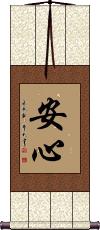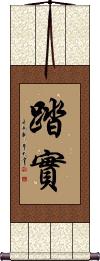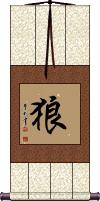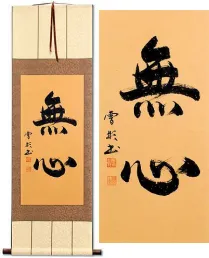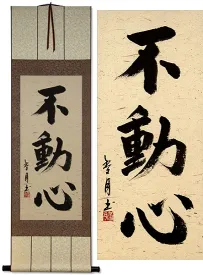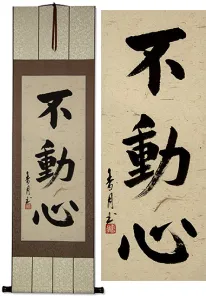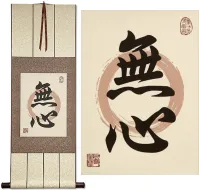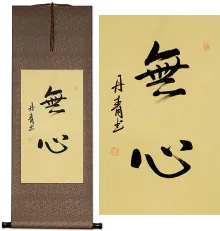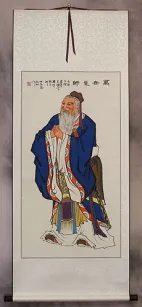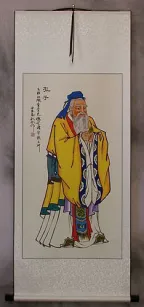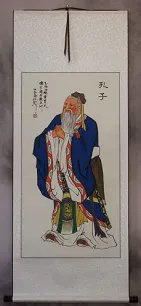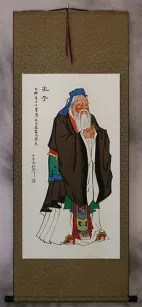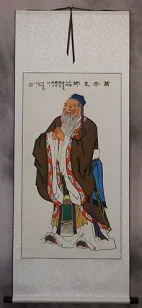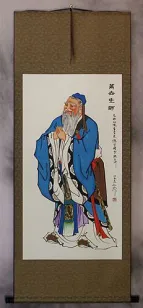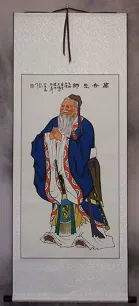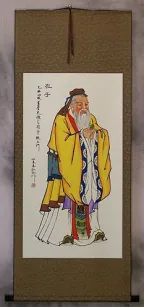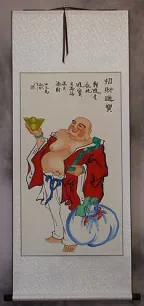Many custom options...
And formats...

Not what you want?
Try other similar-meaning words, fewer words, or just one word.
Great Mind in Chinese / Japanese...
Buy a Great Mind calligraphy wall scroll here!
Personalize your custom “Great Mind” project by clicking the button next to your favorite “Great Mind” title below...
Peaceful Heart / Peace of Mind / Calm Mind
安心 can be defined as relief, peace of mind, feeling at ease, to be relieved, to set one's mind at rest, and easiness.
安心 is a nice word that encompasses great meanings within just two characters. Some of the other meanings include pacifying, settling the mind, and peace of mind. It's also the idea of feeling a sense of security, safety, and confidence in your state of well-being.
This can be used by everyone, but some consider it to be a Buddhist concept (You'll find it in your Zen dictionary).
Note: Can be romanized as Anshin or Anjin in Japanese.
An Open Book Benefits Your Mind
There are several ways to translate this ancient proverb. Translated literally and directly, it says, “Open roll has/yields benefit.”
To understand that, you must know a few things...
First, Chinese characters and language have deeper meanings that often are not spoken but are understood - especially with ancient texts like this. Example: It's understood that the “benefit” referred to in this proverb is to the reader's mind. Just the last character expresses that whole idea.
Second, Chinese proverbs are supposed to make you think and leave a bit of mystery to figure out.
Third, for this proverb, it should be noted that roll = book. When this proverb came about (about two thousand years ago), books were rolls of bamboo slips strung together. The first bound books like the ones we use today did not come about until about a thousand years after this proverb when they invented paper in China.
開卷有益 is a great gift for a bookworm who loves to read and increase their knowledge. Or for any friend that is or wants to be well-read.
Some other translations of this phrase:
Opening a book is profitable
The benefits of education.
Realistic / Practical
Greatest Love
最偉大的愛 means “the greatest love” in Chinese.
Keeping in mind that Chinese is different than English, the first character is like “-est” or adding “the most” as a modifier to the next word.
The 2nd and 3rd characters mean great, mighty, and/or large.
The 4th is a possessive article.
The last is the character for love.
When you put it all together, you get a phrase that means the greatest love, enormous love, or the mightiest love.
Wolf
狼 is the character used to represent the elusive animal known as the wolf in both Chinese and Japanese.
If you are a fan of the wolf or the wolf means something special to you, this could make a great addition to your wall.
Do keep in mind, that much like our perception of wolves in the history of western culture, eastern cultures do not have a very positive view of wolves (save the scientific community and animal lovers). The wolf is clearly an animal that is misunderstood or feared the world over.
狼 is seldom used alone in Korean Hanja but is used in a compound word that means utter failure (as in a wolf getting into your chicken pen - or an otherwise ferocious failure). Not a good choice if your audience is Korean.
This in-stock artwork might be what you are looking for, and ships right away...
Gallery Price: $200.00
Your Price: $118.88
Gallery Price: $200.00
Your Price: $118.88
Gallery Price: $90.00
Your Price: $49.88
Gallery Price: $79.00
Your Price: $43.88
Not the results for great mind that you were looking for?
Below are some entries from our dictionary that may match your great mind search...
| Characters If shown, 2nd row is Simp. Chinese |
Pronunciation Romanization |
Simple Dictionary Definition |
法 see styles |
fǎ fa3 fa hou / ho ほう |
More info & calligraphy: Dharma / The Law(n,n-suf) (1) law; act; principle; (n,n-suf) (2) method; (n,n-suf) (3) {gramm} mood; (n,n-suf) (4) {Buddh} dharma; law; (female given name) Minori Dharma, 達磨; 曇無 (or 曇摩); 達摩 (or 達謨) Law, truth, religion, thing, anything Buddhist. Dharma is 'that which is held fast or kept, ordinance, statute, law, usage, practice, custom'; 'duty'; 'right'; 'proper'; 'morality'; 'character'. M. W. It is used in the sense of 一切 all things, or anything small or great, visible or invisible, real or unreal, affairs, truth, principle, method, concrete things, abstract ideas, etc. Dharma is described as that which has entity and bears its own attributes. It connotes Buddhism as the perfect religion; it also has the second place in the triratna 佛法僧, and in the sense of 法身 dharmakāya it approaches the Western idea of 'spiritual'. It is also one of the six media of sensation, i. e. the thing or object in relation to mind, v. 六塵. |
信心 see styles |
xìn xīn xin4 xin1 hsin hsin shinjin しんじん |
More info & calligraphy: Confidence / Faithful Heart(noun, transitive verb) faith; belief; piety; devotion; godliness A believing mind, which receives without doubting.; Great or firm faith in, or surrender to Buddha, especially to Amitabha. |
十法 see styles |
shí fǎ shi2 fa3 shih fa jippō |
More info & calligraphy: Ten perfect Mahayana rules |
菩薩 菩萨 see styles |
pú sà pu2 sa4 p`u sa pu sa bosatsu(p); bosachi(ok) ぼさつ(P); ぼさち(ok) |
More info & calligraphy: Bodhisattva(n,n-suf) (1) {Buddh} bodhisattva; one who has reached enlightenment but vows to save all beings before becoming a buddha; (n,n-suf) (2) High Monk (title bestowed by the imperial court); (n,n-suf) (3) (See 本地垂迹説) title bestowed to Shinto kami in manifestation theory; (surname) Mizoro bodhisattva, cf. 菩提薩埵. While the idea is not foreign to Hīnayāna, its extension of meaning is one of the chief marks of Mahāyāna. 'The Bodhisattva is indeed the characteristic feature of the Mahāyāna.' Keith. According to Mahāyāna the Hinayanists, i.e. the śrāvaka and pratyekabuddha, seek their own salvation, while the bodhisattva's aim is the salvation of others and of all. The earlier intp. of bodhisattva was 大道心衆生 all beings with mind for the truth; later it became 大覺有情 conscious beings of or for the great intelligence, or enlightenment. It is also intp. in terms of leadership, heroism, etc. In general it is a Mahayanist seeking Buddhahood, but seeking it altruistically; whether monk or layman, he seeks enlightenment to enlighten others, and he will sacrifice himself to save others; he is devoid of egoism and devoted to helping others. All conscious beings having the Buddha-nature are natural bodhisattvas, but require to undergo development. The mahāsattva is sufficiently advanced to become a Buddha and enter nirvāṇa, but according to his vow he remains in the realm of incarnation to save all conscious beings. A monk should enter on the arduous course of discipline which leads to Bodhisattvahood and Buddhahood. |
大 see styles |
dài dai4 tai dai だい |
see 大夫[dai4 fu5] (pref,adj-na,n) (1) large; big; great; huge; vast; major; important; serious; severe; (prefix) (2) great; prominent; eminent; distinguished; (suffix) (3) -sized; as big as; the size of; (suffix noun) (4) (abbreviation) (See 大学・1) university; (5) large (e.g. serving size); large option; (6) (abbreviation) (See 大の月) long month (i.e. having 31 days); (given name) Yutaka Maha. 摩訶; 麼賀. Great, large, big; all pervading, all-embracing; numerous 多; surpassing ; mysterious 妙; beyond comprehension 不可思議; omnipresent 體無不在. The elements, or essential things, i.e. (a) 三大 The three all-pervasive qualities of the 眞如 q.v. : its 體, 相 , 用 substance, form, and functions, v. 起信論 . (b) 四大 The four tanmātra or elements, earth, water, fire, air (or wind) of the 倶舍論. (c)五大 The five, i.e. the last four and space 空, v. 大日經. (d) 六大 The six elements, earth, water, fire, wind, space (or ether), mind 識. Hīnayāna, emphasizing impersonality 人空, considers these six as the elements of all sentient beings; Mahāyāna, emphasizing the unreality of all things 法空, counts them as elements, but fluid in a flowing stream of life, with mind 識 dominant; the esoteric sect emphasizing nonproduction, or non-creation, regards them as universal and as the Absolute in differentiation. (e) 七大 The 楞嚴經 adds 見 perception, to the six above named to cover the perceptions of the six organs 根. |
三大 see styles |
sān dà san1 da4 san ta sandai さんだい |
(prefix) (See 三大疾病) the big three ...; (surname) Miou The three great characteristics of the 眞如 in the 起信論 Awakening of Faith: (1) 體大 The greatness of the bhūtatathatā in its essence or substance; it is 衆生心之體性 the embodied nature of the mind of all the living, universal, immortal, immutable, eternal; (2) 相大 the greatness of its attributes or manifestations, perfect in wisdom and mercy, and every achievement; (3) 用大 the greatness of its functions and operations within and without, perfectly transforming all the living to good works and good karma now and hereafter. There are other groups, e.g. 體, 宗, and 用. |
五智 see styles |
wǔ zhì wu3 zhi4 wu chih gochi ごち |
(place-name, surname) Gochi The five kinds of wisdom of the 眞言宗 Shingon School. Of the six elements 六大 earth, water, fire, air (or wind), ether (or space) 曇空, and consciousness (or mind 識 ), the first five form the phenomenal world, or Garbhadhātu, the womb of all things 胎藏界, the sixth is the conscious, or perceptive, or wisdom world, the Vajradhātu 金剛界, sometimes called the Diamond realm. The two realms are not originally apart, but one, and there is no consciousness without the other five elements. The sixth element, vijñāna, is further subdivided into five called the 五智 Five Wisdoms: (1) 法界體性智 dharmadhātu-prakṛti-jñāna, derived from the amala-vijñāna, or pure 識; it is the wisdom of the embodied nature of the dharmadhātu, defined as the six elements, and is associated with Vairocana 大日, in the centre, who abides in this samādhi; it also corresponds to the ether 空 element. (2) 大圓鏡智 adarśana-jñāna, the great round mirror wisdom, derived from the ālaya-vijñāna, reflecting all things; corresponds to earth, and is associated with Akṣobhya and the east. (3) 平等性智 samatā-jñāna, derived from mano-vijñāna, wisdom in regard to all things equally and universally; corresponds to fire, and is associated with Ratnasaṃbhava and the south. (4) 妙觀察智 pratyavekṣaṇa-jñāna, derived from 意識, wisdom of profound insight, or discrimination, for exposition and doubt-destruction; corresponds to water, and is associated with Amitābha and the west. (5) 成所作智 kṛtyānuṣṭhāna-jñāna, derived from the five senses, the wisdom of perfecting the double work of self-welfare and the welfare of others; corresponds to air 風 and is associated with Amoghasiddhi and the north. These five Dhyāni-Buddhas are the 五智如來. The five kinds of wisdom are the four belonging to every Buddha, of the exoteric cult, to which the esoteric cult adds the first, pure, all-refecting, universal, all-discerning, and all-perfecting. |
五法 see styles |
wǔ fǎ wu3 fa3 wu fa gohō |
pañcadharma. The five laws or categories, of which four groups are as follows: I. 相名五法 The five categories of form and name: (1) 相 appearances, or phenomena; (2) 名 their names; (3) 分別 sometimes called 妄想 ordinary mental discrimination of them— (1) and (2) are objective, (3) subjective; (4) 正智 corrective wisdom, which corrects the deficiencies and errors of the last: (5) 如如 the 眞如 Bhutatathata or absolute wisdom, reached through the 如理智 understanding of the law of the absolute, or ultimate truth. II. 事理五法 The five categories into which things and their principles are divided: (1) 心法 mind; (2) 心所法 mental conditions or activities; (3) 色法 the actual states or categories as conceived; (4) 不相應法 hypothetic categories, 唯識 has twenty-four, the Abhidharma fourteen; (5) 無爲法 the state of rest, or the inactive principle pervading all things; the first four are the 事 and the last the 理. III. 理智五法 cf. 五智; the five categories of essential wisdom: (1) 眞如 the absolute; (2) 大圓鏡智 wisdom as the great perfect mirror reflecting all things; (3) 平等性智 wisdom of the equal Buddha nature of all beings; (4) 妙觀察智 wisdom of mystic insight into all things and removal of ignorance and doubt; (5) 成所作智 wisdom perfect in action and bringing blessing to self and others. IV. 提婆五法 The five obnoxious rules of Devadatta: not to take milk in any form, nor meat, nor salt; to wear unshaped garments, and to live apart. Another set is: to wear cast-off rags, beg food, have only one set meal a day, dwell in the open, and abstain from all kinds of flesh, milk, etc. |
六大 see styles |
liù dà liu4 da4 liu ta rokudai ろくだい |
{Buddh} the six elements (earth, water, fire, wind, void, and consciousness); (place-name) Rokudai The six great or fundamental things, or elements — earth; water; fire; wind (or air); space (or ether); and 識 mind, or perception. These are universal and creative of all things, but the inanimate 非情 are made only of the first five, while the animate 有情 are of all six. The esoteric cult represents the six elements, somewhat differently interpreted in the garbhadhātu and vajradhātu. Also 六大界. |
四禪 四禅 see styles |
sì chán si4 chan2 ssu ch`an ssu chan shizen |
(四禪天) The four dhyāna heavens, 四靜慮 (四靜慮天), i. e. the division of the eighteen brahmalokas into four dhyānas: the disciple attains to one of these heavens according to the dhyāna he observes: (1) 初禪天 The first region, 'as large as one whole universe' comprises the three heavens, Brahma-pāriṣadya, Brahma-purohita, and Mahābrahma, 梵輔, 梵衆, and 大梵天; the inhabitants are without gustatory or olfactory organs, not needing food, but possess the other four of the six organs. (2) 二禪天 The second region, equal to 'a small chiliocosmos' 小千界, comprises the three heavens, according to Eitel, 'Parīttābha, Apramāṇābha, and Ābhāsvara, ' i. e. 少光 minor light, 無量光 infinite light, and 極光淨 utmost light purity; the inhabitants have ceased to require the five physical organs, possessing only the organ of mind. (3) 三禪天 The third region, equal to 'a middling chiliocosmos '中千界, comprises three heavens; Eitel gives them as Parīttaśubha, Apramāṇaśubha, and Śubhakṛtsna, i. e. 少淨 minor purity, 無量淨 infinite purity, and 徧淨 universal purity; the inhabitants still have the organ of mind and are receptive of great joy. (4) 四禪天 The fourth region, equal to a great chiliocosmos, 大千界, comprises the remaining nine brahmalokas, namely, Puṇyaprasava, Anabhraka, Bṛhatphala, Asañjñisattva, Avṛha, Atapa, Sudṛśa, Sudarśana, and Akaniṣṭha (Eitel). The Chinese titles are 福生 felicitous birth, 無雲 cloudless, 廣果 large fruitage, 無煩 no vexations, atapa is 無熱 no heat, sudṛśa is 善見 beautiful to see, sudarśana is 善現 beautiful appearing, two others are 色究竟 the end of form, and 無想天 the heaven above thought, but it is difficult to trace avṛha and akaniṣṭha; the inhabitants of this fourth region still have mind. The number of the dhyāna heavens differs; the Sarvāstivādins say 16, the 經 or Sutra school 17, and the Sthavirāḥ school 18. Eitel points out that the first dhyāna has one world with one moon, one mem, four continents, and six devalokas; the second dhyāna has 1, 000 times the worlds of the first; the third has 1, 000 times the worlds of the second; the fourth dhyāna has 1, 000 times those of the third. Within a kalpa of destruction 壞劫 the first is destroyed fifty-six times by fire, the second seven by water, the third once by wind, the fourth 'corresponding to a state of absolute indifference' remains 'untouched' by all the other evolutions; when 'fate (天命) comes to an end then the fourth dhyāna may come to an end too, but not sooner'. |
大心 see styles |
dà xīn da4 xin1 ta hsin hiromi ひろみ |
(Tw) considerate; thoughtful (from Taiwanese 貼心, Tai-lo pr. [tah-sim]) (personal name) Hiromi great, expansive mind |
行る see styles |
yaru やる |
(transitive verb) (1) (kana only) (colloquialism) to do; to undertake; to perform; to play (a game); to study; (2) (kana only) to send; to dispatch; to despatch; (3) (kana only) to put; to move; to turn (one's head, glance, etc.); (4) (kana only) to give (esp. to someone of equal or lower status); to let have; to present; to bestow; to confer; (5) (kana only) to make (a vehicle) go faster; (6) (kana only) to run (a business); to keep; to be engaged in; to practice (law, medicine, etc.); to practise; (7) (kana only) to have (food, drink, etc.); to eat; to drink; to smoke; (8) (kana only) to hold (a performance); to perform; to show; (9) (kana only) to ease (one's mind); (10) (colloquialism) (kana only) to harm; to injure; to kill; (11) (kana only) (slang) to have sex with; (v5r,vi) (12) (kana only) to live; to get by; to get along; (suf,v5r) (13) (kana only) to do ... completely; (14) (kana only) to do ... broadly; to do ... to a great distance; (aux-v,v5r) (15) (kana only) to do ... for (someone of equal or lower status); to do ... to (sometimes with negative nuance); (16) (kana only) to make active efforts to ... |
遣る see styles |
yaru やる |
(transitive verb) (1) (kana only) (colloquialism) to do; to undertake; to perform; to play (a game); to study; (2) (kana only) to send; to dispatch; to despatch; (3) (kana only) to put; to move; to turn (one's head, glance, etc.); (4) (kana only) to give (esp. to someone of equal or lower status); to let have; to present; to bestow; to confer; (5) (kana only) to make (a vehicle) go faster; (6) (kana only) to run (a business); to keep; to be engaged in; to practice (law, medicine, etc.); to practise; (7) (kana only) to have (food, drink, etc.); to eat; to drink; to smoke; (8) (kana only) to hold (a performance); to perform; to show; (9) (kana only) to ease (one's mind); (10) (colloquialism) (kana only) to harm; to injure; to kill; (11) (kana only) (slang) to have sex with; (v5r,vi) (12) (kana only) to live; to get by; to get along; (suf,v5r) (13) (kana only) to do ... completely; (14) (kana only) to do ... broadly; to do ... to a great distance; (aux-v,v5r) (15) (kana only) to do ... for (someone of equal or lower status); to do ... to (sometimes with negative nuance); (16) (kana only) to make active efforts to ... |
開心 开心 see styles |
kāi xīn kai1 xin1 k`ai hsin kai hsin kaishin |
to feel happy; to rejoice; to have a great time; to make fun of sb To open the heat; to develop the mind; to initiate into truth. |
七最勝 七最胜 see styles |
qī zuì shèng qi1 zui4 sheng4 ch`i tsui sheng chi tsui sheng shichi saishō |
The seven perfections, see唯識論, 9. 安住最勝 Perfect rest in the bodhisattva nature. 依止最勝 perfect reliance on, or holding fast to the great bodhi (awakened mind). 意果最勝 perfect resultant aim in-pity for all 事業最勝 Perfect in constant performance. 巧便最勝 Perfect in able device (for spiritual presentation). 廻向最勝 Perfect direction towards the highest bodhi. 滿淨最勝 Perfect purity and peace. |
大乘因 see styles |
dà shèng yīn da4 sheng4 yin1 ta sheng yin daijō in |
Mahāyāna "cause" is variously described as the mind of enlightenment 菩提心; or the reality behind all things 諸法實相. |
大乘心 see styles |
dà shèng xīn da4 sheng4 xin1 ta sheng hsin daijō shin |
The mind or heart of the Mahāyāna; seeking the mind of Buddha by means of Mahāyāna. |
大信心 see styles |
dà xìn xīn da4 xin4 xin1 ta hsin hsin daishin shin |
mind of great faith |
大心力 see styles |
dà xīn lì da4 xin1 li4 ta hsin li dai shinriki |
The great mind and power, or wisdom and activity of Buddha. |
大心海 see styles |
dà xīn hǎi da4 xin1 hai3 ta hsin hai dai shinkai |
Great mind ocean, i.e. omniscience. |
大悲心 see styles |
dà bēi xīn da4 bei1 xin1 ta pei hsin daihi shin |
mind filled with great compassion |
大義王 大义王 see styles |
dà yì wáng da4 yi4 wang2 ta i wang daigiō |
(or 大義城) The king, or city, of all ideas, or aims, i.e. the heart as mind. |
大道心 see styles |
dà dào xīn da4 dao4 xin1 ta tao hsin daidō shin |
One who has the mind of or for supreme enlightenment, e.g. a bodhisattva-mahāsattva. |
胎藏界 see styles |
tāi zàng jiè tai1 zang4 jie4 t`ai tsang chieh tai tsang chieh taizō kai |
Garbhadhātu, or Garbhakośa-(dhātu), the womb treasury, the universal source from which all things are produced; the matrix; the embryo; likened to a womb in which all of a child is conceived— its body, mind, etc. It is container and content; it covers and nourishes; and is the source of all supply. It represents the 理性 fundamental nature, both material elements and pure bodhi, or wisdom in essence or purity; 理 being the garbhadhātu as fundamental wisdom, and 智 acquired wisdom or knowledge, the vajradhātu. It also represents the human heart in its innocence or pristine purity, which is considered as the source of all Buddha-pity and moral knowledge. And it indicates that from the central being in the maṇḍala, viz. the Sun as symbol of Vairocana, there issue all the other manifestations of wisdom and power, Buddhas, bodhisattvas, demons, etc. It is 本覺 original intellect, or the static intellectuality, in contrast with 始覺 intellection, the initial or dynamic intellectuality represented in the vajradhātu; hence it is the 因 cause and vajradhātu the 果 effect; though as both are a unity, the reverse may be the rule, the effect being also the cause; it is also likened to 利他 enriching others, as vajradhātu is to 自利 enriching self. Kōbō Daishi, founder of the Yoga or Shingon 眞言 School in Japan, adopted the representation of the ideas in maṇḍalas, or diagrams, as the best way of revealing the mystic doctrine to the ignorant. The garbhadhātu is the womb or treasury of all things, the universe; the 理 fundamental principle, the source; its symbols are a triangle on its base, and an open lotus as representing the sun and Vairocana. In Japan this maṇḍala is placed on the east, typifying the rising sun as source, or 理. The vajradhātu is placed west and represents 智 wisdom or knowledge as derived from 理 the underlying principle, but the two are essential one to the other, neither existing apart. The material and spiritual; wisdom-source and intelligence; essence and substance; and similar complementary ideas are thus portrayed; the garbhadhātu may be generally considered as the static and the vajradhātu as the dynamic categories, which are nevertheless a unity. The garbhadhātu is divided into 三部 three sections representing samādhi or quiescence, wisdom-store, and pity-store, or thought, knowledge, pity; one is called the Buddha-section, the others the Vajra and Lotus sections respectively; the three also typify vimokṣa, prajñā, and dharmakāya, or freedom, understanding, and spirituality. There are three heads of these sections, i. e. Vairocana, Vajrapāṇi, and Avalokiteśvara; each has a mother or source, e. g. Vairocana from Buddha's-eye; and each has a 明王 or emanation of protection against evil; also a śakti or female energy; a germ-letter, etc. The diagram of five Buddhas contains also four bodhisattvas, making nine in all, and there are altogether thirteen 大院 or great courts of various types of ideas, of varying numbers, generally spoken of as 414. Cf. 金剛界; 大日; 兩部. |
金剛界 金刚界 see styles |
jīn gāng jiè jin1 gang1 jie4 chin kang chieh kongoukai / kongokai こんごうかい |
(1) {Buddh} (See 胎蔵界・たいぞうかい・1) Vajradhatu; Diamond Realm; (2) (abbreviation) {Buddh} (See 金剛界曼荼羅・こんごうかいまんだら) Vajradathu Mandala; Diamond Realm Mandala vajradhātu, 金界 The 'diamond', or vajra, element of the universe; it is the 智 wisdom of Vairocana in its indestructibility and activity; it arises from the garbhadhātu 胎藏界q.v., the womb or store of the Vairocana 理 reason or principles of such wisdom, v. 理智. The two, garbhadhātu and vajradhātu, are shown by the esoteric school, especially in the Japanese Shingon, in two maṇḍalas, i.e. groups or circles, representing in various portrayals the ideas arising from the two, fundamental concepts. vajradhātu is intp. as the 智 realm of intellection, and garbhadhātu as the 理 substance underlying it, or the matrix; the latter is the womb or fundamental reason of all things, and occupies the eastern position as 'cause' of the vajradhātu, which is on the west as the resultant intellectual or spiritual expression. But both are one as are Reason and Wisdom, and Vairocana (the illuminator, the 大日 great sun) presides over both, as source and supply. The vajradhātu represents the spiritual world of complete enlightenment, the esoteric dharmakāya doctrine as contrasted with the exoteric nirmāṇakāya doctrine. It is the sixth element 識 mind, and is symbolized by a triangle with the point downwards and by the full moon, which represents 智 wisdom or understanding; it corresponds to 果 fruit, or effect, garbhadhātu being 因 or cause. The 金剛王五部 or five divisions of the vajradhātu are represented by the Five dhyāni-buddhas, thus: centre 大日Vairocana; east 阿閦 Akṣobhya; south 寶生Ratnasambhava; west 阿彌陀 Amitābha; north 不 空 成就 Amoghasiddhi, or Śākyamuni. They are seated respectively on a lion, an elephant, a horse, a peacock, and a garuda. v. 五佛; also 胎. |
不厭其煩 不厌其烦 see styles |
bù yàn qí fán bu4 yan4 qi2 fan2 pu yen ch`i fan pu yen chi fan |
not to mind taking all the trouble (idiom); to take great pains; to be very patient |
十六大力 see styles |
shí liù dà lì shi2 liu4 da4 li4 shih liu ta li jūroku dairiki |
The sixteen great powers obtainable by a bodhisattva, i.e. of will, mind, action, shame (to do evil), energy, firmness, wisdom, virtue, reasoning, personal appearance, physical powers, wealth, spirit, magic, spreading the truth, subduing demons. |
大信心海 see styles |
dà xìn xīn hǎi da4 xin4 xin1 hai3 ta hsin hsin hai daishin jinkai |
ocean-like mind of great faith |
大光明王 see styles |
dà guāng míng wáng da4 guang1 ming2 wang2 ta kuang ming wang Dai kōmyō ō |
The Great-Light Ming-wang, Śākyamuni in a previous existence, when king of Jambudvīpa, at Benares. There his white elephant, stirred by the sight of a female elephant, ran away with him into the forest, where he rebuked his mahout, who replied, "I can only control the body not the mind, only a Buddha can control the mind." Thereupon the royal rider made his resolve to attain bodhi and become a Buddha. Later, he gave to all that asked, finally even his own head to a Brahman who demanded it, at the instigation of an enemy king. |
大總法門 大总法门 see styles |
dà zǒng fǎ mén da4 zong3 fa3 men2 ta tsung fa men daisō hōmon |
The bhūtatathatā as the totality of things, and Mind 心眞如 as the Absolute, 起信論. |
Click here for more great mind results from our dictionary
The following table may be helpful for those studying Chinese or Japanese...
| Title | Characters | Romaji (Romanized Japanese) | Various forms of Romanized Chinese | |
| Peaceful Heart Peace of Mind Calm Mind | 安心 | an shin / anshin | ān xīn / an1 xin1 / an xin / anxin | an hsin / anhsin |
| An Open Book Benefits Your Mind | 開卷有益 开卷有益 | kāi juàn yǒu yì kai1 juan4 you3 yi4 kai juan you yi kaijuanyouyi | k`ai chüan yu i kaichüanyui kai chüan yu i |
|
| Realistic Practical | 踏實 踏实 | tā shí / ta1 shi2 / ta shi / tashi | t`a shih / tashih / ta shih | |
| Greatest Love | 最偉大的愛 最伟大的爱 | zuì wěi dà de ài zui4 wei3 da4 de ai4 zui wei da de ai zuiweidadeai | tsui wei ta te ai tsuiweitateai |
|
| Wolf | 狼 | okami | láng / lang2 / lang | |
| In some entries above you will see that characters have different versions above and below a line. In these cases, the characters above the line are Traditional Chinese, while the ones below are Simplified Chinese. | ||||
Successful Chinese Character and Japanese Kanji calligraphy searches within the last few hours...
